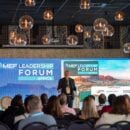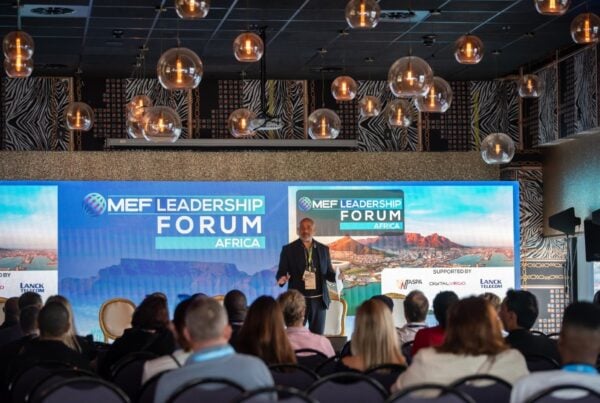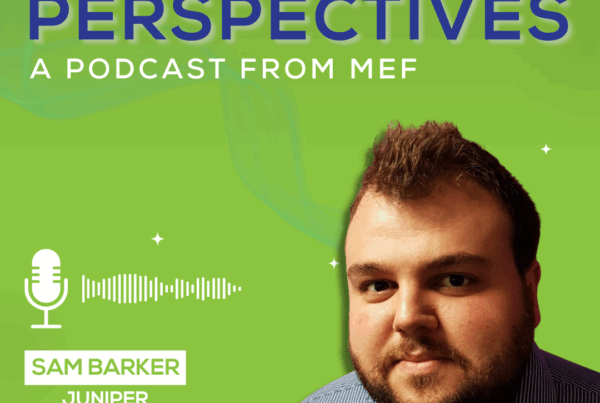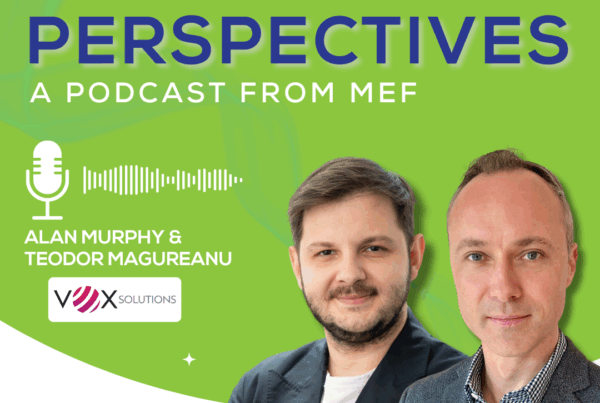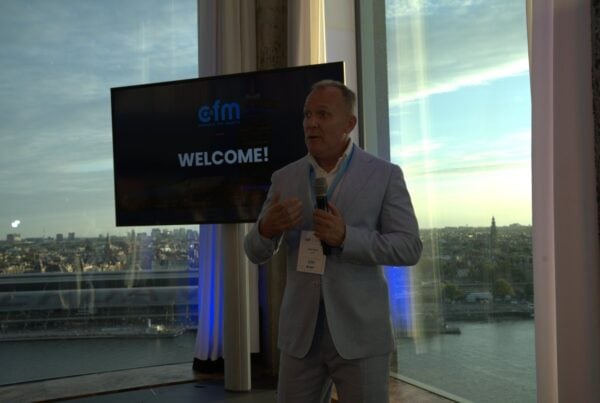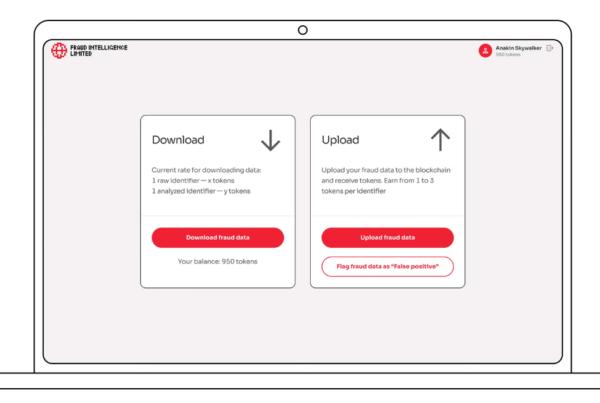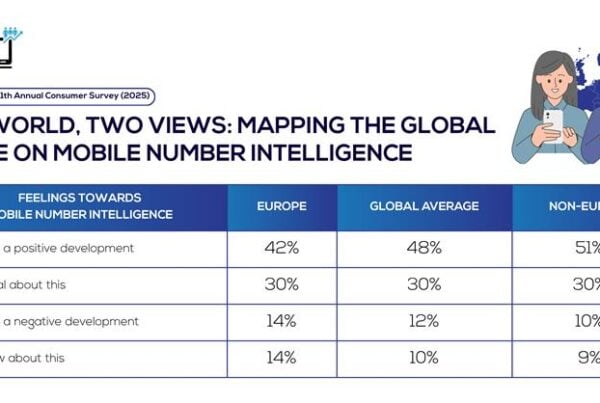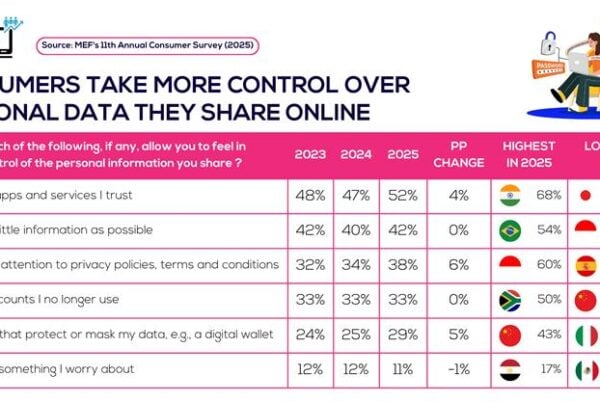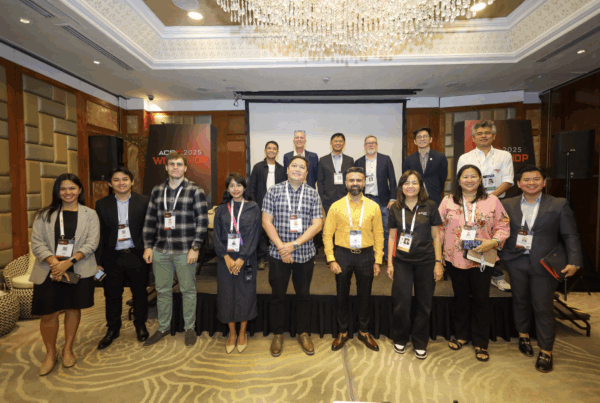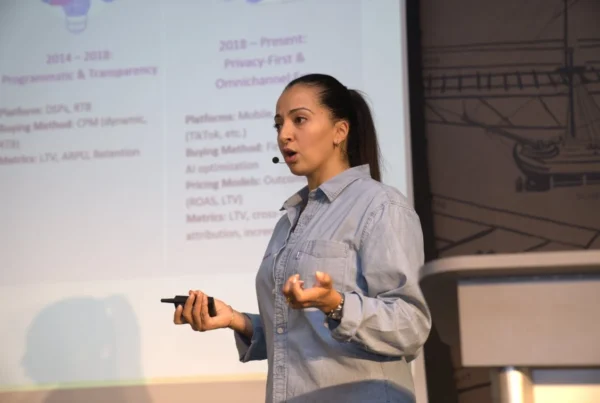MEF BUSINESS NEWS FRIDAY 17 OCT 2025 The International Monetary Fund is warning that renewed tensions between the US and China pose significant risks to global growth. After months of calm, Washington has expanded tech restrictions and proposed tariffs on Chinese ships — moves Beijing met with new export curbs on rare earths. The IMF says if these trade frictions deepen, global growth could shrink by 0.3 percentage points, hitting Asia hardest. The region’s economy is already expected to slow from 4.6% last year to 4.1% in 2026, even as strong exports and tech demand cushion the blow. A sharper split in global supply chains could ripple across everything from semiconductors to smartphones — testing the resilience of the world’s mobile economy. ———— Meanwhile, the Trump administration is set to hand US automakers a major break, with the Commerce Department expected to extend for five years an arrangement that lets carmakers cut what they pay on imported auto parts. The move — likely to be announced Friday — follows months of lobbying from Ford, GM, and Stellantis, who’ve struggled under Trump’s record-high tariffs on vehicles, steel, and aluminum. The relief, originally due to expire after two years, comes as the administration finalizes new tariffs on imported trucks. Automakers argue the change helps them stay competitive with foreign rivals like Toyota, which benefit from cheaper labor and lower trade barriers under the US-Japan deal. GM stock jumped nearly 4% on the news, while Ford and Stellantis also gained. For Detroit, it’s a rare win — and proof that even in Trump’s tariff world, persistence pays off. ——————— The European Central Bank says interest rates are “in a good place,” but behind that calm front, opinions are splitting. President Christine Lagarde told the IMF meetings in Washington the ECB is unlikely to cut rates this month — they’ve held steady at 2% since June. Still, some policymakers see inflation cooling and want cuts soon, while others fear price pressures could rebound. For now, the ECB says it’ll stay “data dependent,” adjusting policy meeting by meeting. That means Europe’s monetary GPS is set to cautious mode — steady hands on the wheel, eyes on every new signal. ——————- The EU has agreed on a €1.5 billion ($1.8 billion) defense plan aimed at strengthening Europe’s security and cutting reliance on US-made weapons. The deal, reached under Denmark’s EU presidency, will fund projects through 2027, with about 20% set aside for cooperation with Ukraine. It also caps non-European components at 35% of project costs — a compromise after months of debate led by France over “buy European” rules. The plan, part of a wider €131 billion defense and space budget proposed for 2028–2034, is designed to boost Europe’s fragmented defense industry and speed up procurement across the bloc. —————————- Three alleged cases of loan fraud have rattled US regional lenders, raising fears of deeper cracks in bank balance sheets. Zions Bancorp and Western Alliance both disclosed losses tied to investment funds linked to Andrew Stupin and Gerald Marcil — who deny wrongdoing — after loans meant for buying distressed mortgages allegedly went missing or were shifted to other entities. Zions’ California Bank & Trust wrote off $50 million, while Western Alliance also took losses. The fallout was swift: shares of 74 major US banks collectively lost over $100 billion in market value on Thursday. Analysts at JPMorgan said the rash of recent credit “one-offs” — from subprime lender Tricolor’s collapse to First Brands’ $10 billion default — suggests investors are getting jumpy. JPMorgan CEO Jamie Dimon warned earlier in the week that “when you see one cockroach, there are probably more.” Big banks can absorb the hits, but regional lenders — still recovering from the 2023 turmoil — are feeling the strain. For now, the industry’s bad-loan provisions suggest most see the damage as containable, but confidence is clearly under review. ————————— Spain’s BBVA says it’s moving on after its $19 billion bid for rival Banco Sabadell collapsed — and Chairman Carlos Torres insists he’s not going anywhere. Torres told Bloomberg TV he’ll stay on “as long as shareholders want,” after three-quarters of Sabadell investors rejected the offer, far below the 30 percent threshold needed to proceed. The failed merger ends 18 months of pursuit and frees BBVA to resume big shareholder payouts, including a new buyback once regulators approve it. For Spain’s banking sector — and its increasingly digital customer base — the setback delays further consolidation, but BBVA says the future is about boosting investor returns, not chasing deals. ——————— Ferrari has quietly throttled back the number of cars it sends to the UK, after new tax rules drove many of its wealthiest buyers to sunnier, lower-tax shores. The end of the non-dom regime and higher levies on the rich rattled demand and sent second-hand Ferrari prices sliding, so the company trimmed supply to stabilise values. Chief executive Benedetto Vigna says it’s not just about taxes — right-hand-drive cars can’t easily be resold elsewhere, adding to the dip. The move shows how fiscal policy now hits even the supercar ecosystem — where exclusivity is the engine of profit. In other words, fewer Ferraris in Mayfair, and maybe fewer revs outside Harrods. —— —— MEF MOBILE NEWS 17 0CT 2025 Samsung is unveiling its first trifold smartphone at the Asia-Pacific Economic Cooperation summit in South Korea later this month, a move aimed at reinforcing its position in the foldable segment. The device features two hinges, letting it function as a standard smartphone or a larger tablet when fully opened, showcasing innovation in mobile form factors. The APEC summit offers a global stage, though attendees will likely only see it under glass ahead of a wider commercial launch later this year. Samsung pioneered foldables in 2019, and competition is heating up with Huawei already offering trifolds and Apple preparing its first folding iPhone. The trifold could reshape how apps and content are consumed across the mobile ecosystem. Foldable tech, bigger screens, new experiences. ——————————— Turkey’s 5G spectrum auction has raised nearly $3 billion, surpassing government expectations and setting the stage for nationwide services next April. Turkcell led spending with over $1.2 billion, followed closely by Turk Telekom and Vodafone, acquiring blocks in both 700MHz and 3.5GHz bands. Eleven frequency packages totaling 400MHz were sold, including extended rights for existing next-gen bands through 2042. Analysts say the auction not only accelerates Turkey’s mobile ecosystem and 5G rollout but also signals robust telecom investment in the region, with widespread impact on mobile services, IoT, and enterprise connectivity. A major boost for Turkey’s digital future. ———————— Ericsson and HPE are launching a joint 5G validation lab in Sweden to test a cloud-native, AI-enabled dual-mode 5G core on multi-vendor infrastructure, aimed at helping telecom operators tackle network complexity and scale efficiently. The lab, operational by year-end, combines Ericsson’s dual-mode 5G core with HPE ProLiant servers, Juniper networking, and Red Hat OpenShift for cloud-native deployment. A step forward for Sweden’s mobile ecosystem and global 5G innovation. ———————— A New Jersey teenager is suing Telegram and the developers of the AI tool ClothOff after a classmate allegedly used it to create fake-nude images of her, raising alarm over AI-generated sexual content involving minors. The lawsuit, backed by Yale Law School faculty and students, targets the British Virgin Islands-based company and the claud based messaging app — Telegram, precisely — where the software could be accessed. Experts say AI deepfakes like these are increasingly classified as child sexual abuse material, and federal law now requires platforms to remove such content within 48 hours. Victims face ongoing fear and reputational harm, while lawmakers and tech platforms scramble to enforce accountability. A landmark case for digital safety. ———————- ———————— Italian news publishers are raising alarms over Google’s AI Overviews, claiming the tool is slashing traffic to original sites and threatening media diversity. The federation of newspaper publishers, FIEG, has lodged a formal complaint with the national communications regulator, Agcom, arguing AI-generated summaries cut advertising revenue and could undermine journalism’s economic sustainability. Research from the UK and US suggests users rarely click links under AI summaries, with traffic drops of up to 80%. Google disputes these findings. As Italy rolls out strict AI regulations protecting minors and limiting harmful uses, publishers warn the mobile ecosystem—where news consumption increasingly happens—is at stake. Digital audiences are reading less, and revenue models are feeling the pinch. ——————- Spotify is joining forces with Sony, Universal, and Warner to develop AI tools that respect artists’ rights and copyright. The streaming giant, with 276 million paying subscribers, says the new products will allow artists to opt in and ensure proper compensation and credit. The company has also launched a generative AI research lab to explore “breakthrough experiences” for fans and creators, while partnering with Merlin and Believe to include independent labels. The move comes amid lawsuits against AI music startups over copyright infringement, with the majors emphasizing that artist consent and licensing will be central to Spotify’s approach. —— —— MEF TECH NEWS 17 OCT 2025 This just in: Micron is exiting China’s data center market after Beijing’s 2023 ban on its server chips failed to lift, though it will continue supplying chips to select customers like Lenovo with operations outside China, as well as auto and mobile phone companies. The U.S. chipmaker, which generated $3.4 billion last year from mainland China, became the first U.S. semiconductor target amid escalating tech tensions between Washington and Beijing. The move underscores the growing impact of geopolitical friction on the global semiconductor supply chain and highlights the risks for companies navigating the mobile and cloud ecosystem in China. ————————— Apple is preparing to launch its first touch-screen MacBook Pro in late 2026 or early 2027, reversing decades of resistance to touch laptops. The new 14- and 16-inch models will use OLED displays, thinner and lighter frames, and Apple’s M6 chips, while retaining keyboards and trackpads to give users flexibility. The move comes as touch-screen PCs are standard across the industry and follows Apple’s experiments with the Touch Bar and iPad Magic Keyboard. Higher-end pricing is expected, creating an opportunity to push users upmarket and unify the Mac and iPad ecosystems. ————————- Investors are rushing into artificial intelligence, but the Financial Times warns it might be a bubble. Venture capitalists have poured more than 160 billion dollars into AI start-ups this year, pushing valuations of firms like OpenAI and Anthropic toward nearly one trillion dollars. The frenzy is driven by hopes that AI will unlock multitrillion-dollar markets, even though most companies are still operating at a loss. A Bank of America survey shows that over half of fund managers believe AI stocks are in a bubble, while experts from the Bank of England caution that investor excitement could trigger a market correction. Industry leaders are divided. Amazon’s Jeff Bezos says the hype fuels both good and bad investments, while OpenAI’s Sam Altman warns some investors could lose massive sums, even as others profit. Economists note the boom isn’t debt-fueled, so a correction would mostly affect shareholders. The Financial Times suggests only a handful of AI companies may ultimately survive — and the rush of money and hype could be creating a bubble in the sector. —————————— Meta is finalizing a nearly $30 billion private capital deal with Blue Owl Capital to co-own its Hyperion data center in rural Louisiana, with Meta keeping just 20%. The financing, structured through a special purpose vehicle, shields Meta’s balance sheet while giving investors access to a massive, asset-backed project. Hyperion spans 4 million square feet and, at full capacity, could draw 5 gigawatts of power — enough for roughly 4 million US homes. Completion is set for 2029, positioning the center to support Meta’s AI and cloud operations and setting a model for hyperscalers raising capital without risking credit ratings. ————————— Nigeria is seeing a nearly $1 billion surge in data center investment as AI adoption and mobile-first habits among its 240 million-strong, young population drive demand for local computing power. Global and regional players like Equinix, Microsoft, MTN, and Rack Centre are building next-generation facilities capable of handling AI workloads, supporting cloud and hybrid services, and linking to global networks. The country’s cloud market is projected to grow from $1 billion this year to $3.3 billion by 2030, while hubs like Lagos’ Itana Digital Zone aim to foster African AI and lower costs for startups. Power reliability remains a hurdle, pushing operators toward gas and renewable solutions. Local AI, global scale. ——————— Nintendo is ramping up production of the Switch 2, aiming for 25 million units by March 2026, betting on strong demand to drive record first-year sales. The move comes after early success with the console, with analysts expecting roughly 20 million units sold this fiscal year. The Japanese company has doubled marketing spend since its June launch and ensured compatibility with the full Switch game library, giving the device a ready-made software ecosystem. The strategy aims to avoid supply pitfalls that hampered rivals like Sony and Microsoft, keeping Nintendo ahead in mobile and hybrid gaming. Strong demand, deep ecosystem, big bets. ——
MEF BUSINESS NEWS FRIDAY 17 OCT 2025 The International Monetary Fund is warning that renewed tensions between the US and China pose significant risks to global growth. After months of calm, Washington has expanded tech restrictions and proposed tariffs on Chinese ships — moves Beijing met with new export curbs on rare earths. The IMF says if these trade frictions deepen, global growth could shrink by 0.3 percentage points, hitting Asia hardest. The region’s economy is already expected to slow from 4.6% last year to 4.1% in 2026, even as strong exports and tech demand cushion the blow. A sharper split in global supply chains could ripple across everything from semiconductors to smartphones — testing the resilience of the world’s mobile economy. ———— Meanwhile, the Trump administration is set to hand US automakers a major break, with the Commerce Department expected to extend for five years an arrangement that lets carmakers cut what they pay on imported auto parts. The move — likely to be announced Friday — follows months of lobbying from Ford, GM, and Stellantis, who’ve struggled under Trump’s record-high tariffs on vehicles, steel, and aluminum. The relief, originally due to expire after two years, comes as the administration finalizes new tariffs on imported trucks. Automakers argue the change helps them stay competitive with foreign rivals like Toyota, which benefit from cheaper labor and lower trade barriers under the US-Japan deal. GM stock jumped nearly 4% on the news, while Ford and Stellantis also gained. For Detroit, it’s a rare win — and proof that even in Trump’s tariff world, persistence pays off. ——————— The European Central Bank says interest rates are “in a good place,” but behind that calm front, opinions are splitting. President Christine Lagarde told the IMF meetings in Washington the ECB is unlikely to cut rates this month — they’ve held steady at 2% since June. Still, some policymakers see inflation cooling and want cuts soon, while others fear price pressures could rebound. For now, the ECB says it’ll stay “data dependent,” adjusting policy meeting by meeting. That means Europe’s monetary GPS is set to cautious mode — steady hands on the wheel, eyes on every new signal. ——————- The EU has agreed on a €1.5 billion ($1.8 billion) defense plan aimed at strengthening Europe’s security and cutting reliance on US-made weapons. The deal, reached under Denmark’s EU presidency, will fund projects through 2027, with about 20% set aside for cooperation with Ukraine. It also caps non-European components at 35% of project costs — a compromise after months of debate led by France over “buy European” rules. The plan, part of a wider €131 billion defense and space budget proposed for 2028–2034, is designed to boost Europe’s fragmented defense industry and speed up procurement across the bloc. —————————- Three alleged cases of loan fraud have rattled US regional lenders, raising fears of deeper cracks in bank balance sheets. Zions Bancorp and Western Alliance both disclosed losses tied to investment funds linked to Andrew Stupin and Gerald Marcil — who deny wrongdoing — after loans meant for buying distressed mortgages allegedly went missing or were shifted to other entities. Zions’ California Bank & Trust wrote off $50 million, while Western Alliance also took losses. The fallout was swift: shares of 74 major US banks collectively lost over $100 billion in market value on Thursday. Analysts at JPMorgan said the rash of recent credit “one-offs” — from subprime lender Tricolor’s collapse to First Brands’ $10 billion default — suggests investors are getting jumpy. JPMorgan CEO Jamie Dimon warned earlier in the week that “when you see one cockroach, there are probably more.” Big banks can absorb the hits, but regional lenders — still recovering from the 2023 turmoil — are feeling the strain. For now, the industry’s bad-loan provisions suggest most see the damage as containable, but confidence is clearly under review. ————————— Spain’s BBVA says it’s moving on after its $19 billion bid for rival Banco Sabadell collapsed — and Chairman Carlos Torres insists he’s not going anywhere. Torres told Bloomberg TV he’ll stay on “as long as shareholders want,” after three-quarters of Sabadell investors rejected the offer, far below the 30 percent threshold needed to proceed. The failed merger ends 18 months of pursuit and frees BBVA to resume big shareholder payouts, including a new buyback once regulators approve it. For Spain’s banking sector — and its increasingly digital customer base — the setback delays further consolidation, but BBVA says the future is about boosting investor returns, not chasing deals. ——————— Ferrari has quietly throttled back the number of cars it sends to the UK, after new tax rules drove many of its wealthiest buyers to sunnier, lower-tax shores. The end of the non-dom regime and higher levies on the rich rattled demand and sent second-hand Ferrari prices sliding, so the company trimmed supply to stabilise values. Chief executive Benedetto Vigna says it’s not just about taxes — right-hand-drive cars can’t easily be resold elsewhere, adding to the dip. The move shows how fiscal policy now hits even the supercar ecosystem — where exclusivity is the engine of profit. In other words, fewer Ferraris in Mayfair, and maybe fewer revs outside Harrods. —— —— MEF MOBILE NEWS 17 0CT 2025 Samsung is unveiling its first trifold smartphone at the Asia-Pacific Economic Cooperation summit in South Korea later this month, a move aimed at reinforcing its position in the foldable segment. The device features two hinges, letting it function as a standard smartphone or a larger tablet when fully opened, showcasing innovation in mobile form factors. The APEC summit offers a global stage, though attendees will likely only see it under glass ahead of a wider commercial launch later this year. Samsung pioneered foldables in 2019, and competition is heating up with Huawei already offering trifolds and Apple preparing its first folding iPhone. The trifold could reshape how apps and content are consumed across the mobile ecosystem. Foldable tech, bigger screens, new experiences. ——————————— Turkey’s 5G spectrum auction has raised nearly $3 billion, surpassing government expectations and setting the stage for nationwide services next April. Turkcell led spending with over $1.2 billion, followed closely by Turk Telekom and Vodafone, acquiring blocks in both 700MHz and 3.5GHz bands. Eleven frequency packages totaling 400MHz were sold, including extended rights for existing next-gen bands through 2042. Analysts say the auction not only accelerates Turkey’s mobile ecosystem and 5G rollout but also signals robust telecom investment in the region, with widespread impact on mobile services, IoT, and enterprise connectivity. A major boost for Turkey’s digital future. ———————— Ericsson and HPE are launching a joint 5G validation lab in Sweden to test a cloud-native, AI-enabled dual-mode 5G core on multi-vendor infrastructure, aimed at helping telecom operators tackle network complexity and scale efficiently. The lab, operational by year-end, combines Ericsson’s dual-mode 5G core with HPE ProLiant servers, Juniper networking, and Red Hat OpenShift for cloud-native deployment. A step forward for Sweden’s mobile ecosystem and global 5G innovation. ———————— A New Jersey teenager is suing Telegram and the developers of the AI tool ClothOff after a classmate allegedly used it to create fake-nude images of her, raising alarm over AI-generated sexual content involving minors. The lawsuit, backed by Yale Law School faculty and students, targets the British Virgin Islands-based company and the claud based messaging app — Telegram, precisely — where the software could be accessed. Experts say AI deepfakes like these are increasingly classified as child sexual abuse material, and federal law now requires platforms to remove such content within 48 hours. Victims face ongoing fear and reputational harm, while lawmakers and tech platforms scramble to enforce accountability. A landmark case for digital safety. ———————- ———————— Italian news publishers are raising alarms over Google’s AI Overviews, claiming the tool is slashing traffic to original sites and threatening media diversity. The federation of newspaper publishers, FIEG, has lodged a formal complaint with the national communications regulator, Agcom, arguing AI-generated summaries cut advertising revenue and could undermine journalism’s economic sustainability. Research from the UK and US suggests users rarely click links under AI summaries, with traffic drops of up to 80%. Google disputes these findings. As Italy rolls out strict AI regulations protecting minors and limiting harmful uses, publishers warn the mobile ecosystem—where news consumption increasingly happens—is at stake. Digital audiences are reading less, and revenue models are feeling the pinch. ——————- Spotify is joining forces with Sony, Universal, and Warner to develop AI tools that respect artists’ rights and copyright. The streaming giant, with 276 million paying subscribers, says the new products will allow artists to opt in and ensure proper compensation and credit. The company has also launched a generative AI research lab to explore “breakthrough experiences” for fans and creators, while partnering with Merlin and Believe to include independent labels. The move comes amid lawsuits against AI music startups over copyright infringement, with the majors emphasizing that artist consent and licensing will be central to Spotify’s approach. —— —— MEF TECH NEWS 17 OCT 2025 This just in: Micron is exiting China’s data center market after Beijing’s 2023 ban on its server chips failed to lift, though it will continue supplying chips to select customers like Lenovo with operations outside China, as well as auto and mobile phone companies. The U.S. chipmaker, which generated $3.4 billion last year from mainland China, became the first U.S. semiconductor target amid escalating tech tensions between Washington and Beijing. The move underscores the growing impact of geopolitical friction on the global semiconductor supply chain and highlights the risks for companies navigating the mobile and cloud ecosystem in China. ————————— Apple is preparing to launch its first touch-screen MacBook Pro in late 2026 or early 2027, reversing decades of resistance to touch laptops. The new 14- and 16-inch models will use OLED displays, thinner and lighter frames, and Apple’s M6 chips, while retaining keyboards and trackpads to give users flexibility. The move comes as touch-screen PCs are standard across the industry and follows Apple’s experiments with the Touch Bar and iPad Magic Keyboard. Higher-end pricing is expected, creating an opportunity to push users upmarket and unify the Mac and iPad ecosystems. ————————- Investors are rushing into artificial intelligence, but the Financial Times warns it might be a bubble. Venture capitalists have poured more than 160 billion dollars into AI start-ups this year, pushing valuations of firms like OpenAI and Anthropic toward nearly one trillion dollars. The frenzy is driven by hopes that AI will unlock multitrillion-dollar markets, even though most companies are still operating at a loss. A Bank of America survey shows that over half of fund managers believe AI stocks are in a bubble, while experts from the Bank of England caution that investor excitement could trigger a market correction. Industry leaders are divided. Amazon’s Jeff Bezos says the hype fuels both good and bad investments, while OpenAI’s Sam Altman warns some investors could lose massive sums, even as others profit. Economists note the boom isn’t debt-fueled, so a correction would mostly affect shareholders. The Financial Times suggests only a handful of AI companies may ultimately survive — and the rush of money and hype could be creating a bubble in the sector. —————————— Meta is finalizing a nearly $30 billion private capital deal with Blue Owl Capital to co-own its Hyperion data center in rural Louisiana, with Meta keeping just 20%. The financing, structured through a special purpose vehicle, shields Meta’s balance sheet while giving investors access to a massive, asset-backed project. Hyperion spans 4 million square feet and, at full capacity, could draw 5 gigawatts of power — enough for roughly 4 million US homes. Completion is set for 2029, positioning the center to support Meta’s AI and cloud operations and setting a model for hyperscalers raising capital without risking credit ratings. ————————— Nigeria is seeing a nearly $1 billion surge in data center investment as AI adoption and mobile-first habits among its 240 million-strong, young population drive demand for local computing power. Global and regional players like Equinix, Microsoft, MTN, and Rack Centre are building next-generation facilities capable of handling AI workloads, supporting cloud and hybrid services, and linking to global networks. The country’s cloud market is projected to grow from $1 billion this year to $3.3 billion by 2030, while hubs like Lagos’ Itana Digital Zone aim to foster African AI and lower costs for startups. Power reliability remains a hurdle, pushing operators toward gas and renewable solutions. Local AI, global scale. ——————— Nintendo is ramping up production of the Switch 2, aiming for 25 million units by March 2026, betting on strong demand to drive record first-year sales. The move comes after early success with the console, with analysts expecting roughly 20 million units sold this fiscal year. The Japanese company has doubled marketing spend since its June launch and ensured compatibility with the full Switch game library, giving the device a ready-made software ecosystem. The strategy aims to avoid supply pitfalls that hampered rivals like Sony and Microsoft, keeping Nintendo ahead in mobile and hybrid gaming. Strong demand, deep ecosystem, big bets. ——






